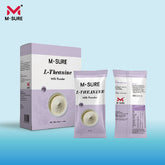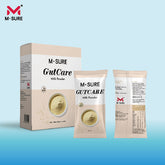Key Nutrients for Children and Adolescents
by
BiotechAusway
25 Apr 2025
Children and adolescents undergo rapid growth and development, making optimal nutrition essential during these critical years. Proper intake of key nutrients supports physical growth, cognitive development, and a robust immune system. Below is a comprehensive guide to the most important nutrients for growing bodies and minds.
I. Core Nutrients
Protein
-
Function: Builds muscles, bones, and organs; supports tissue repair and overall growth.
-
Recommended Intake: 2–4 grams per kilogram of body weight per day.
-
Best Sources: Milk, eggs, lean meats, soy products.
Calcium
-
Function: Vital for bone and teeth development; deficiency can lead to stunted growth or osteoporosis.
-
Absorption Tip: Requires vitamin D for proper absorption.
-
Best Sources: Dairy products, legumes, leafy green vegetables.
Vitamin D
-
Function: Regulates calcium and phosphorus levels to support bone health.
-
Best Sources: Sunlight exposure, fatty fish (like salmon), fortified dairy and cereals.
II. Key Micronutrients
Iron
-
Function: Supports the formation of hemoglobin, prevents anemia, and aids in cognitive development.
-
Best Sources: Red meat, organ meats (like liver), dark leafy greens.
Zinc
-
Function: Enhances immune function and cognitive development; deficiency may impair growth.
-
Best Sources: Shellfish, nuts, seeds, and lean meats.
III. Essential Fatty Acids
DHA (Docosahexaenoic Acid)
-
Function: Critical for brain cell development, memory, and focus—especially vital for school-age children.
-
Best Sources: Fatty fish (salmon, sardines), algae-based supplements, fish oil.
IV. Vitamins and Minerals
-
Vitamin A: Supports vision and bone development. Sources: Carrots, liver, dairy.
-
Vitamin C: Boosts immunity and helps with iron absorption. Sources: Citrus fruits, berries, leafy greens.
-
B Vitamins: Essential for energy metabolism and nervous system health. Sources: Whole grains, eggs, meat, legumes.
-
Multivitamin Supplements: Should only be used under medical supervision if dietary intake is inadequate.
V. Dietary Recommendations
-
Promote a Diverse Diet: Ensure daily intake includes vegetables, fruits, whole grains, proteins, and dairy to avoid nutritional gaps.
-
Limit Processed Foods: Cut down on sugary and fatty snacks which may hinder nutrient absorption.
-
Follow Supplementation Principles: Prioritize whole food sources. Supplements should only be used when necessary and under professional guidance.
VI. Nutrient Priorities by Age Stage
Pre-Adolescence (Under 12 Years)
-
Emphasize calcium, protein, and vitamin D to support foundational growth and bone strength.
Adolescence (12–18 Years)
-
Focus on increasing intake of protein, calcium, iron, and zinc to meet the intense physical and developmental demands of puberty.






